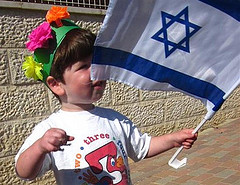 We ‘have’ kids. Sounds so passive, doesn’t it?
We ‘have’ kids. Sounds so passive, doesn’t it?
Isn’t it more like, we find someone to have kids with, settle in with them, work at it for a few months to a few years, attempt to save money to cushion the initial shock, bring forth a baby into the world with extreme amounts of energy, and work every single second of our lives thereafter to ensure their health and safekeeping?
 Here’s an infographic courtesy of Early Childhood Education. It’s absolutely addressing data based in the United States. Which blows my mind, just to see the college figures.
Here’s an infographic courtesy of Early Childhood Education. It’s absolutely addressing data based in the United States. Which blows my mind, just to see the college figures.
Israel runs a totally different show; not to say raising kids here isn’t costly, it’s just costly in different ways. Our salaries are lower, our cost of living is higher (our standard of living is high). Import tax makes goods more expensive than they’d be elsewhere. Small population, less choice/less supply/higher prices. I’m no economist, and I can’t really, ahem, afford to wax philosophic about it all.
But I feel like shedding a little light.
There’s a good breakdown of costs for a family of four in the context of what to expect when you make aliyah. Note: I take no responsibility for how off this is in Tel Aviv. That’s your fault for living there ;)
But these are relevant to where I live, Tzur Hadassah, a 1500-family yishuv 20 minutes outside Jerusalem.
Numbers in Israeli shekels:
- Housing (rent or mortgage): 4000-5000
- Arnona (annual property tax): 300-500 (roughly 5,000 a year – very dependent on where you live)
- Water: 120-250
- Electricity: 250-500
…and so on (cell phone, gas, car, petrol, TV, va’ad bayit). But I digress. Children-related expenses, on a monthly basis, look a little like this – for my community, anyway:
- Daycare for babies until 3: 1500-2500 (lower number reflects range in Beitar Illit, an option)
- Gan 3+: Free as of 2012/2013, but parents provide ‘aruchat eser’
- Tzaharon (after 2:30pm): 800+
- School fees: up to 1050 a year
- Tin of formula: 50+
- Acamol/Nurofen: +/- 30-40
Clothes are expensive unless you shop at deep discount stores like Bazaar Strauss and whatnot. Toys are ridiculously expensive – look at mamibuy.co.il for what a deal is here, and then consider the everyday price. I paid for a toy at Shilav with gift certificates equaling 350nis that costs about $36 in the States.
Books are actually decent; I find book stores here hold sales like 3 for 100nis quite often.
Then there’s the issue of weekend activities… A movie ticket is about 35nis. A museum entrance for a kid can be 25nis and up. The Jerusalem Biblical Zoo costs 38nis for a kid above the age of 3. A fast food kids’ meal runs between 25-40nis.
Considering chugim, like swimming lessons or music class? That can start at 40nis a lesson.
Know Hebrew and want to get a sense of food prices? Check out Shufersal’s online storefront. Prices here can be on the higher side, but it’s pretty much reality if you live in a city or popular area (non-charedi).
Keep in mind the average salary in Israel is around 9,000nis (as of March 2012).
I’m not painting a complete picture here, but I figured I’d give a start to the way of thinking when it comes to children expenses here. But it doesn’t stop us from having them: in 2010, 28% of Israel’s population was aged between 0-14. The average size of the Israeli family is 3.7 persons… which I actually find hard to believe while looking around here.
I haven’t included a lot. Add whatever comes to mind in the comments.

Whadya got: